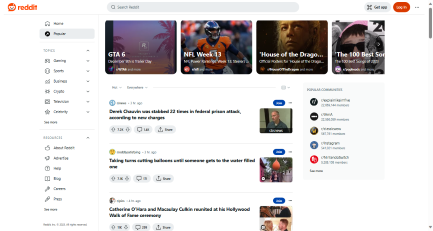- cross-posted to:
- reddit@lemmy.world
- youshouldknow@lemmy.world
- cross-posted to:
- reddit@lemmy.world
- youshouldknow@lemmy.world
I started to notice some thing weird while using Reddit, every link post from Condé Nast owned news outlet was getting a high amount of upvotes and awards while other publications had a very normal rate of awards( usually zero, with the exception of the sponsored ones) and upvotes.
That when I started to investigate this matter till I found out about this.


They are boosting their publications on Reddit on the major subreddits. They are trying to give their publications a advantage over all the other news outlets.
They have the ability to kill the other news outlets if they keep doing that. Avoid them as if your freedom is dependent on it.



I wrote for Ars for a brief period, on Linux topics. This was prior to the digg exodus. As a writer, I got a set rate for each page of content, with an expected average word count per page. I’d get a bonus anytime my story hit the front page of digg, slashdot, or similar aggregater. It happened a few times.
But that bonus incentive meant I was encouraged to specifically write stories that would resonate with those audiences. It wasn’t fraud or a scam – it was free market economic pressure. But the effect was the same – I was tailoring my content to maximize aggregator exposure.
I began to submit my own stories to Slashdot and similar, because a minute of my time could pay me $100 or whatever.
I am not sure that reddit is biased towards these publications as much as they are likely intentionally gaming the algorithms, and encouraging their writers to do the same – write content you know will hit the frontpage. I don’t think it is wrong necessarily, but it certainly isn’t organic.
That said, Ars generally has very high quality content due to some very good reporters. Eric Berger comes to mind. So it could be both effects: quality and gaming the system.
I probably read a few of your articles, unless you were covering Arch. Not sure if that was yet a thing at the time of the Digg fiasco.
It’s sad that those were the incentive structures, but I find it unsurprising. By my final years in a newsroom, reporters had quotas for social-media posts. Guess what you’re not doing when you need to tweet eight times a day? Actual reporting.
One might say, “OK, but it doesn’t take that much time out of your day,” which I’ll grant, but it takes you out of the flow. If you’re thinking about your next tweet, you aren’t thinking about what other source you need to talk to that would solidify the story.
Corporate journalism is digging (no pun intended) its own grave in many cases. Longform is still going strong (e.g. Ars, Rolling Stone, The Atlantic), and I’m relatively certain Ars has cost me way more than just the subscription. I learned about Factorio on there, and a few weeks later, I got my life back.
A feedback cycle where no one wants to pay for content, so advertisers are needed to fund their staff, which means clicks and engagement become the metric of success. But, the solution is either publicly funded news (largely unpopular), or regulating the open internet (more unpopular). So, yeah, the death of corporate journalism is coming.
Ah, publicly funded news. Which the junta is trying to eviscerate.
I’ve honestly been pushing for the death of corporate journalism, as we’re past the point where it can be rebuilt. Under this structure, there is no path forward, especially given the widespread fealty revealed last fall by LAT and WaPo.
We have a thriving propaganda community within journalism, but that’s, uh … not the goal here. It’s not as though boots-on-the-ground reporters want to be doing this, but fucked-up motivators lead to fucked-up results in any industry.
But hey, a few more mergers can fix that before it’s revealed as a house of cards, causing mass layoffs while executives sip mojitos.
I hate this timeline.